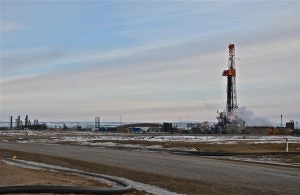 This blog was co-authored by Jon Goldstein and Sara Brodnax
This blog was co-authored by Jon Goldstein and Sara Brodnax
Last week, the U.S. Department of the Interior’s Bureau of Land Management collected comments from citizens and groups concerned about the impacts of a proposed 5,000-well oil and gas project in eastern Wyoming.
The situation has a troubling irony, because as BLM reviews the project’s environmental risks, it is simultaneously working to roll back its own commonsense standards to stop oil and gas companies from venting, flaring, and leaking away pollution and valuable natural gas.
It’s the same story for the greater sage-grouse, which without strong mitigation measures will likely abandon critical breeding sites in the area set to be impacted by the planned oil and gas project. Here, too, BLM has signaled several attempts to unravel the collaborative, decades-forged plans to protect the imperiled bird.
The combination of weakening policies while expanding development could have disastrous consequences for Wyoming and other western states if methane pollution goes unchecked and the greater sage-grouse continues to decline.
Poor stewardship of public lands and taxpayer-owned resources
Without sensible oversight in Converse County, where this project’s 5,000 wells would be drilled, Wyoming taxpayers will be left with more pollution and millions of dollars in wasted natural gas.
In fact, a new report from the Wyoming Outdoor Council estimates venting, flaring, and leaks of natural gas already cost Wyoming up to $96 million in wasted natural gas every year. And this means Wyoming taxpayers are missing out on as much as $16 million in lost revenue every year. Capturing more of that wasted gas could help Wyoming communities fund education and infrastructure, as well as create jobs in efficient energy production. This waste problem will only get worse if these 5,000 new Converse County wells are drilled without sensible waste reduction measures in place.
Something similar happened in Pinedale. Rapid oil and gas development at times put it on par with smoggy Los Angeles in terms of ozone levels. Fortunately, the state of Wyoming stepped in to address the issue by requiring that well operators check facilities for leaks that cause high smog levels.
Unfortunately, those state standards don’t apply to the proposed project in eastern Wyoming. That means if BLM continues to try and dismantle its methane waste prevention rule, and the state of Wyoming doesn’t intervene to implement similar statewide controls, the communities of Converse County will be left with dirtier air and millions of dollars less in royalties meant for their schools and roads.
Wyoming’s recreation and restoration economies could suffer
There are additional missed opportunities for economic gains to be had from greater sage-grouse conservation.
The outdoor recreation and tourism industries benefit from roughly $1 billion a year in economic output driven by sage-grouse. Wyoming will lose out on these economic opportunities if essential protections – like the State of Wyoming’s Greater Sage-grouse Core Area Strategy – are not carefully implemented.
While BLM is dragging its feet on implementing conservation plans for the bird, the landscape is being developed in a way that could have long-term consequences for the sage-grouse and the 360 other species of concern that share this landscape.
Wyoming Governor Matt Mead has been a long-term leader on protecting Wyoming’s air quality and its sage grouse. The people of Wyoming, therefore, should not be left holding the bag for Interior Secretary Ryan Zinke’s negligence in cutting wasted taxpayer resources and protecting our imperiled bird species.
John Goldstein is EDF’s director of regulatory and legislative affairs for oil and gas. Sara Brodnax is EDF’s senior manager of habitat markets. They are both based in Wyoming.
Image via Willow Belden









